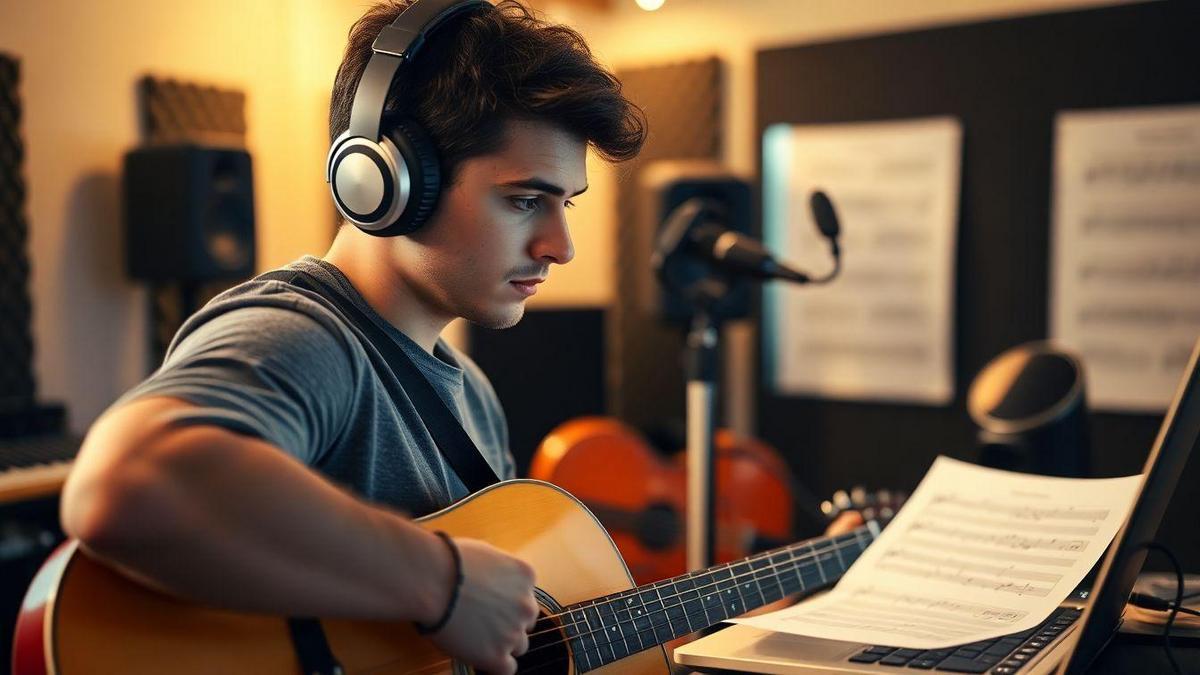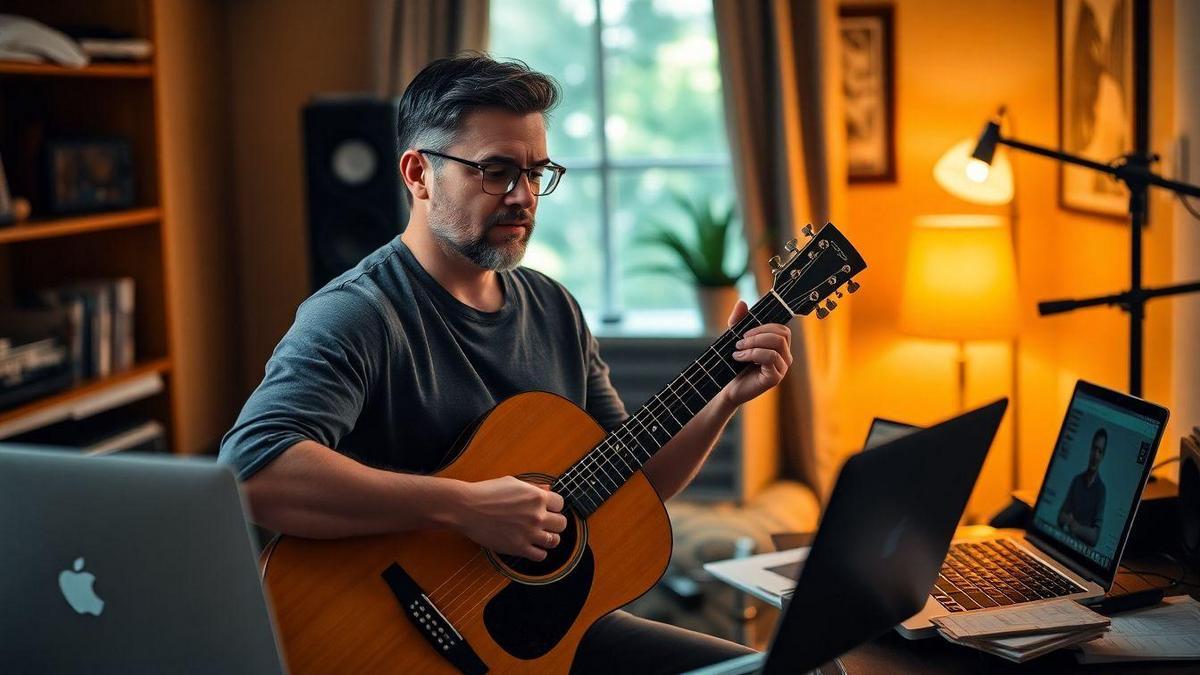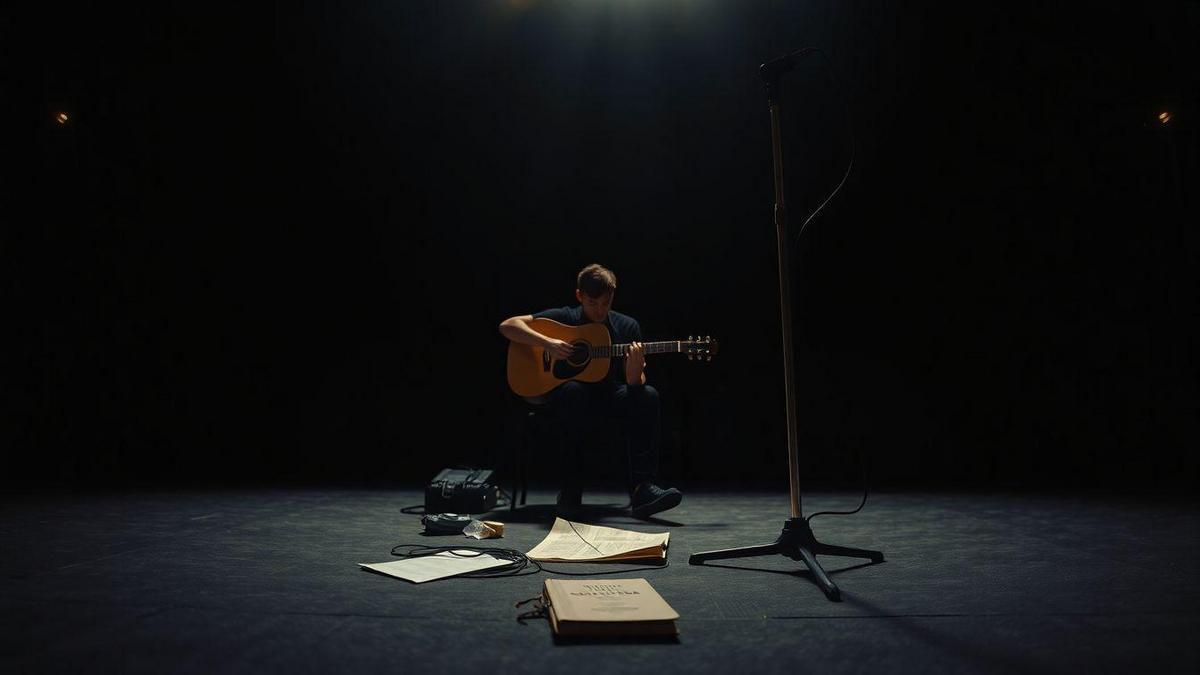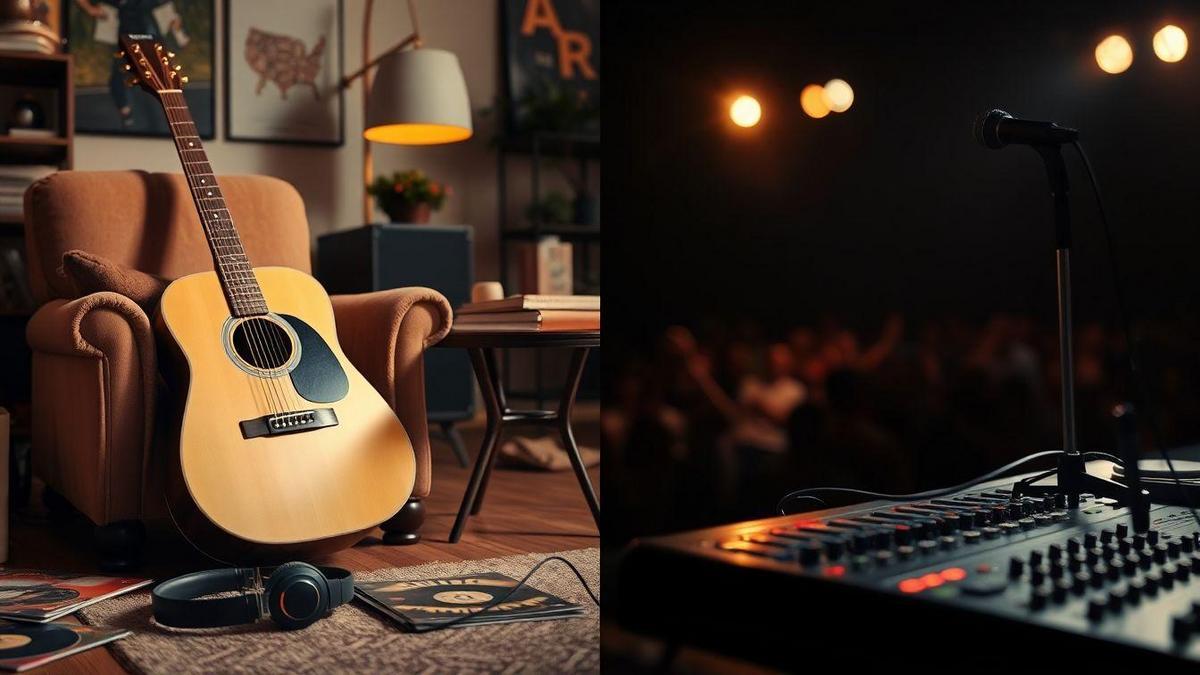Should music be your hobby or your career?
Should music be your hobby or your career? I know this choice can feel hard. I write from my own journey and share the practical steps I used: listing goals and time, weighing passion and money, using a quick checklist, and testing income paths like gigs, teaching, and streaming. I cover the skills I learned, how I practice, the lifestyle adjustments I made, and my plan for balance so you can decide.
Key takeaway
- I enjoy music as a hobby because it makes me happy.
- I worry I won’t earn enough if it becomes my career.
- I try small gigs to test working in music.
- A clear plan and steady practice are needed to make music a job.
- You can do music as both a hobby and a job to stay balanced.

How I decide: Should music be your hobby or your career?
Listing my goals and time
I start by writing my top goals: fun, skill, income, or stability — one line each. Then I check how many hours per week I can realistically give.
- Hobby: typically 2–10 hours/week.
- Career: usually 15–40 hours/week, plus admin time.
Simple match table:
| Goal example | Hours/week I can give | Likely fit |
|---|---|---|
| Play for fun with friends | 2–6 | Hobby |
| Get better and gig locally | 8–15 | Hobby → Career (transition) |
| Teach, record, tour | 20–40 | Career |
I once wanted to tour as a drummer but only had 6 hours/week. I kept drumming as a hobby while building skills — it saved stress and kept joy. If you’re unsure which instrument fits your life, consider guides like how to choose your first instrument without regrets or the series comparing guitar, keyboard, or drums to match sound and schedule.
Assessing passion and money needs
Two simple questions: Do I still love music after long practice? Do I need music to pay my bills?
- If I enjoy reps, drills, and rejection, I have the passion for a career. (If you worry about whether talent matters more than work, see talent vs practice.)
- If music is a happy escape, it fits as a hobby.
Money is practical: list monthly needs (rent, food, insurance) and potential music income paths with rough estimates:
| Income path | Typical starting pay (rough) | Notes |
|---|---|---|
| Private lessons | $20–50 / hour | Steady if you build students |
| Local gigs | $50–200 / gig | Varies a lot |
| Session work | $25–100 / hour | Needs network |
| Streaming | cents per play | Long game, needs volume |
If bills are high, music must earn more — that means more hours and a plan. Early teaching at $30/hour paid small bills and built confidence for me.
Quick checklist I use
- Do I wake up excited to practice? Yes / No
- Can I handle rejection and low pay at first? Yes / No
- Do I have 15 hours/week to grow skills and market myself? Yes / No
- Do I need music income to cover essentials now? Yes / No
- Am I willing to learn business tasks (booking, taxes, promotion)? Yes / No
If procrastination is a challenge, the practical approaches in how to stop procrastinating on music practice helped me turn good intentions into consistent minutes. A tiny answers table helps me decide fast.

What I learned about financial viability of a music career
Typical income paths: gigs, teaching, streaming
Income usually comes from a few paths. I tried each and learned what fit me. See the typical pay and job outlook for musicians for government data on wages and common work settings.
| Path | Typical pay (range) | What I liked | What I watched out for |
|---|---|---|---|
| Gigs (bars, private events) | $50–$300 / show | Fast cash, live crowd | Pay varies; no shows some weeks |
| Teaching (private lessons) | $20–$60 / hour | Steady hours | Time heavy; scheduling needs |
| Streaming & royalties | fraction of a cent per stream | Passive over time | Needs many plays to earn much |
| Session work / recording | $30–$200 / session | Paid per project | Irregular, project-based |
My first bar gig earned $80 but a bad sound system almost ruined it — still a win. Teaching gave me my first steady month. Streaming? Tiny pay for thousands of plays; treat it as exposure, not quick income.
How I plan for irregular pay
I built simple weekly rules:
- Keep a baseline budget of real monthly needs.
- Maintain a 3-month emergency fund.
- Pay myself a fixed weekly withdrawal to mimic a salary.
- Use basic contracts and track invoices for timely payment.
- Keep a small part-time job for slow seasons until music covers basics.
| Strategy | What it solves |
|---|---|
| Baseline budget | Knows minimum money needed |
| Emergency fund | Covers gaps in income |
| Weekly withdrawal | Smooths cash flow |
| Contracts & invoices | Gets paid faster |
I learned to treat music income like waves: save on high tide, float on low tide.
Money tips I follow
- Diversify income: mix gigs, teaching, and digital sales.
- Set lesson rates by market and raise them slowly.
- Take deposits for big jobs (30% deposit protects time).
- Track every sale and tip in a simple spreadsheet.
- Reinvest a small percent into tools (mic, class).
- Use a separate bank account for music money.
Asking for a deposit stopped a no-show and paid for a replacement PA.

Skills I need for a music career
Musical craft vs business sense
I divide effort between musical craft and business sense. Both are required if you want to play for pay.
- Musical craft: timing, pitch, songwriting, performance. (If chords feel fuzzy, a clear primer like what chords are and why they matter can help.)
- Business sense: networking, marketing, money management, contracts.
| Skill type | Key skills | Why it matters | How I practice |
|---|---|---|---|
| Musical | Ear, timing, repertoire | Makes playing reliable | Daily warmups, slow practice, perform songs |
| Creative | Songwriting, arranging | Lets you stand out | Write one short idea weekly |
| Performance | Stage presence, set flow | Keeps audiences hooked | Play for friends, record shows |
| Business | Branding, social media | Brings listeners | Post clips, learn simple design |
| Administrative | Budget, contracts | Protects income | Track expenses, read contract tips |
I often asked myself: “Should music be your hobby or your career?” That question guides which skills to sharpen. If theory seems daunting, is music theory really that scary? offers a friendly take.
How I practice and track progress
Short, steady sessions beat long, random ones. The practice philosophy in the power of just twenty minutes daily is a game-changer for staying consistent. The Music Teachers National Association offers effective practice routines and strategies for structuring short daily sessions and tracking progress reliably.
- Set one clear goal per session (e.g., clean chord changes).
- Use a metronome and record practice. (If reading charts is new, try how to read chords and sheet music.)
- Speed up by 5% only after clean slow play.
- Get feedback monthly from a teacher or peer.
Tools: notebook, voice recorder app, metronome app. I write one sentence each week about what improved. For building a simple daily plan, see how to create a simple practice routine.
Skill milestones I track
| Milestone | How I measure it | Typical timeframe |
|---|---|---|
| Clean simple song | Play start-to-finish without mistakes | 2–4 weeks |
| Play with others | Keep tempo and listen in a jam | 1–3 months |
| Record a demo | One song recorded and mixed | 2–6 months |
| Book a paid gig | Signed agreement and payment | 3–12 months |
| Build audience | 200 engaged listeners/followers | 6–12 months |
Each milestone is a checkpoint — hit one, set the next.

Why I keep music as a hobby
How music helps mood and focus
Music is my quick mood lifter. Ten minutes of instrumental music clears my head before work. Rhythm steadies the mind; melody soothes nerves — the ideas in music as therapy reflect what I feel daily. The American Music Therapy Association outlines the benefits of music for mental health if you want evidence-based context.
What helps me most:
- Rhythm keeps my mind steady.
- Melody soothes my nerves. (If you’re curious why some songs give chills, see why some songs give us goosebumps.)
- Silence breaks let ideas settle.
A quick example: a two-song break before a deadline calmed me and helped me finish faster.
Low-cost ways I enjoy music daily
I keep music simple: free apps, public playlists, secondhand instruments, earbuds. For affordable instrument ideas, check five affordable instruments perfect for beginners and considerations for choosing like how to choose your first instrument without regrets.
Daily habits:
- Morning: short playlist while making coffee.
- Commute: music podcasts or mixes.
- Evening: practice one song for fun.
| Low-cost option | Why I use it |
|---|---|
| Free streaming playlists | Quick mood fix without cost |
| Secondhand instrument | Affordable and playable |
| Earbuds I already own | Portable and simple |
| Local library CDs | No-cost access to music books and records |
Hobby routines that work for me
Small routines fit real life and build progress. If starting feels scary, overcoming the fear of starting music helped me take the first steps.
My routine:
- 10 minutes listening warm-up.
- 15–30 minutes focused practice three times a week.
- One day a week of free play or recording.
| Day | Time | Activity |
|---|---|---|
| Mon | 10 min | Listening warm-up |
| Wed | 20 min | Practice chords |
| Fri | 30 min | Learn a new song |
| Sun | 15 min | Play freely or record |
Short sessions prevent burnout and keep joy alive.

Steps I took when pursuing music professionally
Building a portfolio and online presence
Treat your portfolio like a shop window: short bio, three audio samples, a headshot, contact info. Make it easy for someone to play a track and email you in two clicks. For simple market research and positioning tips, the SBA guide to plan business and market your services is useful when defining who you serve.
| What to include | Why it matters | Quick tip |
|---|---|---|
| Bio (2–3 lines) | Shows who you are | Use plain language and one emotion word |
| 3 audio samples | Shows skill | Pick different styles if you can |
| Contact & rates | Makes hiring easier | List email and one price range |
| Short video (60s) | Builds trust | Record in natural light, clear sound |
Update the portfolio monthly with new recordings or skills.
Finding gigs, clients, and steady work
Split focus into three lanes: playing live, teaching, and freelance/session work.
Ways I found work:
- Local reach: visit cafes, rehearsal spaces; leave a card.
- Online platforms: list services on marketplaces.
- Direct outreach: short polite messages to bandleaders/studio owners.
| Opportunity | How I approached it | Result I looked for |
|---|---|---|
| Live shows | Drop a link, offer a short set | One paid slot or split night |
| Teaching | Offer one free trial lesson | Long-term students |
| Session work | Share a tight demo | Paid one-off recordings |
Consistent action — one message a day, one lesson a week — grew steady work.
Action steps I took
- Practice with purpose: 30 minutes focused daily. (If you want a compact plan, try short daily sessions.)
- Record a short EP; pick the best three tracks for my portfolio.
- Make a one-page rate sheet and add it to my site.
- Reach out politely to local venues with a one-line pitch.
- Offer a free trial lesson to attract students.
- Set aside time to learn basic recording and mixing.
- Track leads in a spreadsheet and follow up within three days.
Small, repeatable steps build real momentum.

How I adapt to the lifestyle of professional musicians
Being a musician is like running a small business: odd hours and constant movement. I plan, protect energy, and pack smart.
Managing odd hours and travel
Rules that keep me steady:
- Block short sleep windows on travel days.
- Pack a simple travel kit.
- Set soft boundaries for calls/social time after gigs.
- Give myself a buffer before soundcheck.
| What I pack | Why it helps |
|---|---|
| Earplugs, throat lozenges, water | Protect hearing/voice; stay hydrated |
| Healthy snacks | Stable energy when options are scarce |
| Small pillow, eye mask | Better rest on planes/layovers |
| Power bank, chargers | Avoid stress from dead devices |
After flubbing a set from missed naps, I now guard my energy like an instrument.
Caring for voice, hands, and rest
My body is my tool: warm up, cool down, rest.
- Voice: 10–15 minute warm-up, hydrate, vocal rest after big shows.
- Hands: stretch fingers/wrists daily; use light massage.
- Rest: consistent sleep, short naps when needed, screens off 30 minutes before bed.
| Area | Daily habit | Quick tip |
|---|---|---|
| Voice | Warm-up hydrate | Sip warm water with honey if throat is sore |
| Hands | Stretch gentle strength | Use a rubber ball for grip work |
| Rest | Consistent sleep times | Dark room, cool temp, block blue light |
A week of no sleep taught me rest is non-negotiable.
Daily routine I try to keep
- Morning: light movement, 10-minute warm-up, healthy breakfast.
- Midday: practice (30–60 min), healthy lunch, short walk.
- Pre-show: focused warm-up, hydrate, mental check-in.
- Post-show: cool-down, light snack, 20–30 minute rest.
- Night: wind-down routine, screens off.
Flex the routine for travel and shows — the goal is steady care, not perfection.

The music career challenges and risks I faced
Income instability and burnout
Music income is patchy. I watch three traps: low streaming pay, irregular gig work, and hidden costs (equipment, travel).
| Income Source | Typical pay (rough) | Main risk | What hit me |
|---|---|---|---|
| Streaming | < $0.005 per stream | Money tiny per play | Thousands of plays, almost no cash |
| Local gigs | $50–$300 / night | Dates cancel/pay late | Promoter canceled two shows in a week |
| Teaching / lessons | $20–$60 / hour | Clients change schedules | Student roster dropped in summer |
| Session work | $25–$75 / hour | Sporadic work | Busy weeks, then silence |
Burnout came from trying to do everything. I learned to mark limits and protect my energy.
Copyright, contracts, and legal basics
A song is not fully protected by creation alone. Income splits into publishing, master, and performance. Bad contracts can give away rights. For official steps on registration and forms, see how to register and protect your songs.
| Term | What it means | What I do |
|---|---|---|
| Copyright | Legal claim to a song/recording | Register songs early |
| Publishing | Songwriting income | Track co-writers and splits |
| Master rights | Income from a recording | Keep copies and label ownership |
| Sync license | Use in TV/ads | Read offers slowly; ask questions |
| Exclusive deal | Sign away rights to one company | Avoid unless pay/time limits are clear |
I once lost control of a live recording by missing a contract clause. Now I read every contract and ask: Who gets the rights?
Risk mitigation steps I use
- Track income monthly in a spreadsheet.
- Save a buffer (2–3 months of expenses).
- Register songs promptly.
- Use split sheets with collaborators.
- Read contracts out loud; consult a lawyer for tricky offers.
- Limit workload and block rest days.
| Step | Time to set up | Benefit |
|---|---|---|
| Basic budget & buffer | 1–2 hours | Less stress in slow months |
| Copyright registration | 30–60 min/song | Clear legal proof |
| Split sheets | 10–20 min | Avoids future fights |
| Contract review habit | 15–30 min/agreement | Catches bad deals early |
Small, regular actions keep things sounding good.

How I balance music hobby and work — should music be your hobby or your career?
Scheduling practice without losing income
I treat practice like a bill I pay each week. Micro-practice wins; the ideas in twenty-minute daily practice and simple practice routines helped me keep momentum without losing income.
- Micro-practice: 15–30 minute sessions.
- Pick times that don’t cut work hours (early morning, lunch).
- Trade skills for cash: teach a short lesson to keep money flowing.
- Schedule rest — burnout costs time and money.
| Day | Practice | Income-friendly task |
|---|---|---|
| Mon | 20 min (scales) | Quick tutoring session |
| Wed | 30 min (song) | Prep a lesson plan |
| Fri | 20 min (ear training) | Play a small paid gig |
| Sat | 60 min (focused) | Record a short clip to sell |
A simple phone table keeps my schedule honest.
Setting clear short and long-term goals
Goals make practice useful.
- Short-term (1–3 months): learn 3 songs, master a chord change. (To read chords faster, see how to read chords and sheet music.)
- Long-term (6–24 months): feel confident gigging, record a set, teach regularly.
| Goal type | Example | Measure |
|---|---|---|
| Short-term | Learn 3 songs | Play each song without mistakes |
| Long-term | Play a 30-min gig | Book one paid show |
I review progress every Sunday and break missed goals into smaller parts.
My balance plan
I protect work hours and music time.
- Block two practice windows each week.
- Keep one income-generating music task (lesson, gig, or post).
- Use a checklist: warm-up, focused skill, song run-through.
- Track time (minutes practiced), not perfection.
- Adjust monthly based on results.
Weekly example:
- Mon morning: 20 min scales.
- Wed lunch: 30 min song practice one 30-min paid lesson.
- Sat: 60–90 min focused session and a short recording.
This plan evolves with life, keeping both job and music healthy.

Music education and career pathways I explored
Degrees, certificates, and self-teaching
Each route trades off time, cost, and outcomes.
| Path | Typical time | Typical cost | Key strength | Key drawback |
|---|---|---|---|---|
| Bachelor degree | 3–4 years | $$$ | Deep theory, ensemble, connections | Time and money |
| Short certificate / bootcamp | 2–12 months | $–$$ | Fast skill upgrade, focused topics | Narrow scope |
| Self-teaching | Variable | $–$$ | Flexible, low start cost | Can miss feedback/structure |
I chose a certificate for production: structure and a mentor helped fast. If self-teaching, find regular feedback and remember approaches to beat hesitation in overcoming the fear of starting.
Quick checklist for choosing:
- What do I want in 1 year?
- How much can I spend and commit weekly?
- Do I need network or just skills?
Teaching, session work, and online platforms
I tried all three: teaching gave steady income; session work demanded speed and reliability; online platforms helped scale lessons and reach.
Practical starter actions:
- Teaching: offer a free trial lesson; track student goals monthly.
- Session work: make a 2-minute demo; save templates for fast turnaround.
- Online: post 1 useful clip/week; reply quickly to comments/leads.
| Path | Starter action | One useful habit |
|---|---|---|
| Teaching | Offer free trial | Track student goals each month |
| Session work | Make 2-min demos | Save templates for fast turnaround |
| Online | Post 1 useful clip/week | Reply quickly to comments/leads |
Pathway map I created
| Step | What I did | Why it mattered |
|---|---|---|
| 1. Assess goals | Wrote 3 clear goals: play, teach, record | Gave direction |
| 2. Pick learning route | Chose certificate self-practice | Fast skills flexibility |
| 3. Build basics | Daily 20–40 min practice, learn recording | Small wins add up |
| 4. Create portfolio | 3 demos, 5 lesson plans | Proof of skill |
| 5. Offer services | Local teaching online gigs | Real feedback and income |
| 6. Iterate | Review monthly, change prices, add skills | Keeps growth steady |
Short steps made progress visible; each small win led to the next action.
Quick answer: Should music be your hobby or your career?
Short version: there’s no single right answer. If art matters more than safety, a career might call you. If you need calm and stability, keep music a hobby and let it recharge you. You can also do both: test the water with small gigs and lessons while protecting your main income. Ask yourself the two core questions: passion for the grind, and money needs. Use small experiments to decide.
Conclusion
I’ve walked both paths. I kept music a hobby when I needed joy and stability, and I tested the waters with small gigs and lessons before leaning into a career. That slow approach preserved my love and paid my bills.
My practical rules: list clear goals, count available time, make a tiny plan you can stick to, save a buffer, diversify income, and use contracts. Practice with purpose: short, steady sessions beat marathon chaos.
Start small, track progress, read contracts, protect your body, and be kind to yourself. If you want more guides and stories, read more at https://clickneutro.com.
Frequently asked questions
Q: Should music be your hobby or your career?
A: Ask what feeds your soul and what pays your bills. Test with small gigs and lessons. If art outweighs safety, try a career; if you need calm, keep it a hobby. You can also combine both.
Q: Can I do both a hobby and a career in music?
A: Yes. Carve time for fun, block time for work, and guard your joy. Be honest about burnout.
Q: What steps should I take to turn music into a career?
A: Learn daily, gig small, grow fans online, save for rough months, find mentors, and stay patient. Practical actions (portfolio, demos, teaching, basic contracts) matter more than waiting for a breakthrough.
If you want a printable one-page checklist or a weekly practice template based on this plan, I can create that next.

1 comentário em “Should music be your hobby or career”